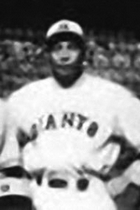Adelano Rivera
| Date and Place of Birth: | 1910 The Philippines |
| Date and Place of Death: | February 10, 1945 The Philippines |
| Baseball Experience: | Japanese Professional League |
| Position: | Outfield |
| Rank: | Unknown |
| Military Unit: | Army of the Philippines |
| Area Served: | Pacific |
Adelano Rivera was born in the Philippines in 1910. The Tokyo Kyojin
(Giants) of the Japanese Professional Baseball League spotted the young
outfielder - who was captain of the Manila Customs Office semi-pro team
- during their tour of the Philippines in January 1939 and
invited him to play in Japan. During their time in Manila, the Giants
lost only two games, both against teams that featured Rivera.
Rivera arrived in Japan in April 1939. He hit the first grand slam in
Giants' hsitory on August 24, 1939, in Korakuen Stadium against Nagoya.
The game was scoreless until the bottom of the sixth inning,
when Rivera hit his shot with two out to lead the Giants to a 4-1 win.
His wife, Amparo, who had competed in the Far East Olympics in Tokyo in
1930 as a volleyball player, joined him in Tokyo during the summer and
he developed a fondness for the country and its people.
During his only season in professional baseball, Rivera batted .268 in
76 games with six home runs and 42 RBIs.
In December, 1939, Rivera and his wife left Japan for Manila with the
Giants team. When the ship entered port, dozens of boats gathered around
and welcomed him. Rivera, in turn, waved joyfully to them from the
deck.
"When World War II started," says Aroma, his oldest daughter, "my father joined the American guerrillas and for several months we couldn't contact him. We thought he had died, but one day he returned home. We lived in the part of Manila which was the scene of fiercest fighting, down the street from Rizal Stadium. Japanese soldiers were in the stadium. The Americans were at the other end of the street. All of our neighbors took refuge in their homes, but my father didn't because he believed that when it's time to die, you die. We saw the battle raging in the sky. About 2 pm on February 10, 1945, approximately eight Japanese soldiers came to our house and asked my father to come to the American Army with them. My father followed them. Maybe he felt that if he didn't go with them, all his family would be killed. On the way we heard some gunfire and some quarreling voices. After the gunfire stopped, we went outside and saw my father dead, shot in the head with his stomach bayonetted. More Japanese soldiers were approaching, so we dragged him into the house. Five days later, we buried him. It was a terrible experience. February 10, the day my father was killed, was my birthday. My father always made rice cakes for me on my birthday."
Sources:
"Requiem for Four Players Who Had Checkered Careers" - Number Magazine
(March 1984)
Thanks to Harrington "Kit" Crissey for help with this biography
Date Added February 2, 2012
Baseball's Greatest Sacrifice is associated with Baseball Almanac
Baseball's Greatest Sacrifice is proud to be sponsored by

